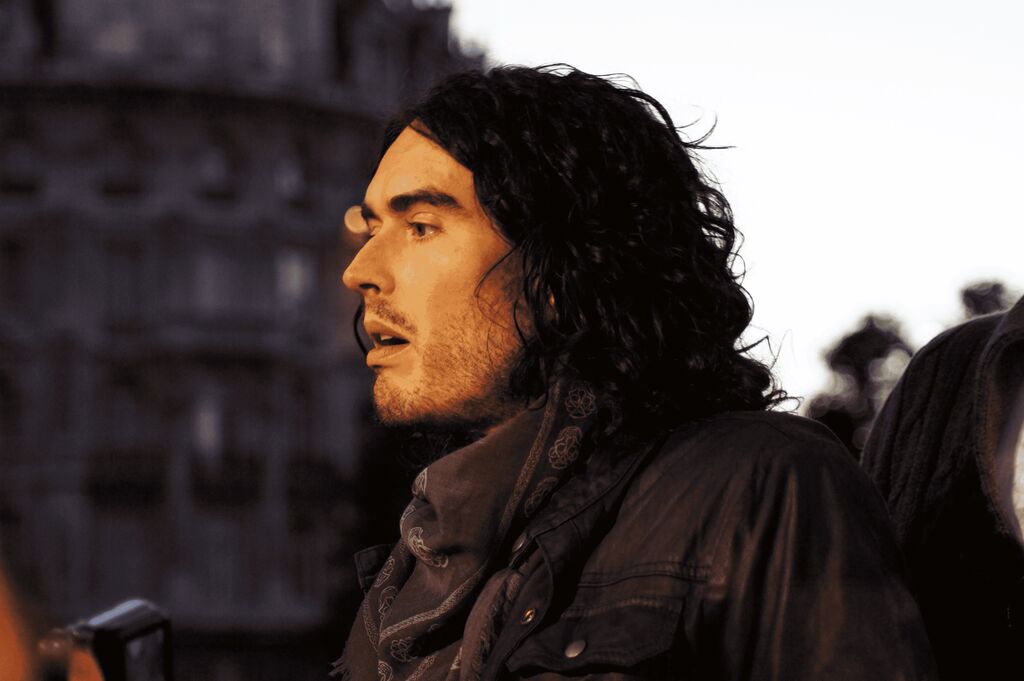What created Russell Brand? And what can we do about it?

Warning: This article contains a description of sexual abuse and covers sensitive themes. It may not be suitable for some of our younger readers. Please read with caution.
He looks ‘demonic’, one said. ‘An absolutely horrible man’, said another. ‘I just don’t understand his appeal.’ That’s how the conversation went in the CARE office a couple of days ago. Because for the last week now, the headlines have been dominated by the allegations made against the comedian-turned-commentator-turned-activist-turned-actor Russell Brand (yes, seriously, he has gone through that many renaissances).
With his hair unkempt, his eyes looking crazed, and his language coarse, Brand was unlikely to be high on many Christians’ recommended watching; but love him or loathe him, he has seared himself into public consciousness for his, ahem, colourful personality (in multiple ways). He even represented the ‘Best of British’ in the London Olympics Closing Ceremony in 2012 leading a rendition of ‘I am the Walrus’, and was famously courted by Ed Miliband in the run-up to the 2015 election (somewhat unsuccessfully, given he didn’t register to vote).
But since The Times published the findings of their 4-year investigation last weekend, far more sinister misdeeds have been alleged. It began with accusations of sexual assault from four different women - none of whom had talked to one another, and none of whom had taken any money from The Times - from between the period of 2006 and 2013.
Their claims had been substantiated by undeleted text messages, notes from medical practices and therapists, and private emails and letters. The Met Police announced that they had begun investigating Brand during the week. And headline after headline has appeared - particularly emanating from personalities from television and the world of comedy - that Brand was known as a ‘predator’, and that dark rumours swirled around him. The story was brought to the top of the news again yesterday, after a woman accused Brand of exposing himself to her and then laughing about it live on his BBC radio show just minutes later.
One of the victims is a young woman who says that Brand - after she refused to take part in three-way sexual activity - pushed her up against the wall and assaulted her without using a condom. A friend whom she confided in took her to Santa Monica Medical Centre’s Rape Treatment Centre the next day. The Times have seen the medical records. The young woman’s text message to Brand, published by The Times, is, quite frankly, disturbing to read.
“...You have a problem, you need help. It’s dangerous that you think you can get your own way all the time, Do you know how scary you are when the glaze look comes over you. When a girl say[s] NO it means no. Do I have to go and get myself tested? Last time you asked me condom or no condom. When I say condom that doesn’t mean it[‘s] optional.”
Our prayers are with the victims, and with all victims around the world who suffer such horrendous abuse. Within the UK, it is estimated that 98% of sexual assaults go unpunished. Elsewhere in the world, it is worse.
Any sexual assault is utterly horrific, a selfish form of dehumanising somebody precious, who is made in God’s image. And one day God will - as with all things - judge it in full, on a day when every perpetrator is brought to justice.
Of course, investigations are now ongoing, Brand himself denies the allegations, and we do not believe in trial by social media. Years on now, he seems to be a reformed individual, of a fashion. He once openly declared himself to be a sex addict: “I was having sex with different women three, four, five times a day. It was bacchanalian. In Ireland, nine in one evening.” But now he has been married for six years.
What created Russell Brand? What are the lessons we can learn? And what can we advocate for, telling a better story, than the one Brand has himself lived in.
The human heart
Russell Brand has full responsibility for the crimes he has committed. Regardless of the culture which has enabled him, that is not in dispute.
As Christians, we believe that every human heart has been infected by sin. Whereas the secular world believes that humanity is essentially good, we believe that although everyone has the capacity for goodness (through ‘common grace’), since the Fall of mankind, for all of us, our hearts incline towards evil.
As Jesus once said, “Out of the heart come evil thoughts—murder, adultery, sexual immorality, theft, false testimony, slander” (Matthew 15:9).
Our instincts are to be selfish and to pursue our own happiness; and this is the case within the sexual sphere as in all others (indeed, arguably, even more so). By turning our back on God and on his wisdom for life (as revealed in Scripture), we have decided that we know best. We have rejected his good design, and God has given us over to ourselves. Or as Paul put it in Romans 1, a passage which links back our sexual sin to our rejection of God as creator:
“Therefore God gave them over in the sinful desires of their hearts to sexual impurity for the degrading of their bodies with one another. They exchanged the truth about God for a lie, and worshiped and served created things rather than the Creator—who is forever praised. Amen.” (Romans 1:24-25).
All of us are sinners, and all of us are sexual sinners; which of us can stand before God’s throne and say we have met Jesus’ requirements to never lust after another?
Indeed, if the Huw Edwards scandal (or indeed, the seemingly never-ending litany of sexual scandals within the church) taught us anything earlier in the summer, surely it is this: that sin is crouching at the door of us all, and we should all be watchful.
A troubled background
But although we all fall short of God’s standards, that does not mean that we do so equally (aka, all sin is genuinely sinful, and worthy of God’s judgement; but some sin is particularly extreme).
There is a line in Jane Austen’s Pride and Prejudice where the clueless clergyman Mr Collins says of Lydia, who has run off with the philanderer Mr Wickham: “I am inclined to think that her own disposition must be naturally bad, or she could not be guilty of such an enormity, at so early an age.”
No one but God knows quite what is nature, and what is nurture, and I am wary of drawing a causal line from past experience to present actions; at minimum, we must say that nothing absolves Brand of his own sins.
But by all accounts, Brand’s own background does appear to be particularly troubled.
Brand’s parents separated when he was just six months old (links have been repeatedly established between relationship breakdown and all kinds of adverse outcomes for children). His mother was diagnosed with cancer when he was 8, and he was sent away to live with relatives. At 14, he developed bulimia.
The Bible is quite clear about the crucial role parents play in bringing up their children. “Start children off on the way they should go, and even when they are old they will not turn from it,” the book of Proverbs declares.
And yet his father took him to visit prostitutes in Thailand while he was still a teenager, procuring two for himself, and one for his son. Brand himself was a victim of sexual abuse at the hands of a tutor.
It is essential for Christians to continue to advocate for strong family units - and to provide wisdom on parenting - if we are to work against young men being brought up with such misogynistic and selfish sexual attitudes.
An enabling culture
As the BBC and Channel 4 begin their investigations this week, attention will turn, inevitably, to who knew what and when.
Brand has always been notorious for his pushing of limits. Most famous, perhaps, was when he and Jonathan Ross left lewd messages on the answering machine of the actor Andrew Sachs about having had sex with his granddaughter, an incident which prompted more than 18,000 complaints to the BBC (the third highest in its history), although in the interests of full disclosure, the show was pre-recorded, and the BBC were themselves responsible for publishing the content (which is quite a commentary on society in and of itself).
But this was hardly an isolated incident. In 2006, Danni Minogue described him as "a bit of a vile predator", and said "I certainly don't think he has cured his sex addiction"; live on the BBC (yes, really), he jokingly offered his personal assistant to Jimmy Savile for sexual purposes; and he asked Vanessa Feltz (again, supposedly joking) whether he could sleep with her daughters live on air at around the same time.
Channel 4’s recent documentary about him was entitled ‘In Plain Sight’. How depressingly true.
Whilst one can defend Brand by saying that the above behaviour is not criminal, this itself is at the root of the problem: the standards to which we expect public figures to adhere should be higher than just ‘not criminal’.
The columnist Liz Kershaw this week wrote about her own time at the BBC and the way in which Brand’s behaviour was indulged. She quoted the BBC DJ Paul Gambaccini: “The fact is that he was [the controller of Radio 2’s] pet, and she let him get away with so many outrageous things. [She] had a commitment to Russell which was almost obsessive. That is to say, she stood by him through thick and thin even while he was alienating almost everyone else.”
As Christians, we believe that those in authority - and this principle extends to bosses at work - have a responsibility to promote what is good, and to restrain what is evil. If an employee behaves in a manner which is unacceptable, we believe that they should face the consequences of their actions. And the reality is that Brand’s behaviour was enabled when he was seen as a star to be indulged, rather than being held to the same standards as everybody else.
A world without rules
The Russell Brand saga illustrates well what a world without rules leads to.
We have been supposedly freed by the Sexual Revolution of the 1960s, which has left only one rule left: that of sexual consent (and it is contravening this rule which is bringing Brand down now).
Whereas in a different age, Brand would never have been given a platform to boast about his extensive sexual exploits, in today’s world, he has been able to make a career in comedy out of them.
One of the most horrifying stories which The Times revealed this week centres around a 16-year-old girl who Brand slept with. Brand was 31 at the time. He even sent his car to take her out of school.
This, in and of itself, was not illegal, even though he reportedly referred to her as ‘the child’ over a 3-month sexual relationship. The only reason that particular case came to light at all, was because he forced himself upon her on at least one occasion.
In a world where there are no rules except consent, all kinds of damaging behaviours are permitted.
49% of men have tried to copy behaviour which they have seen in pornographic content, and 36% of men say that pornography was their primary way of learning about sex
38% of women have experienced unwanted choking, slapping or gagging during sex
A Labour MP argued in a Parliamentary debate last year that asphyxiation should be taught within RSE lessons
And of course, where there are no rules, that always benefits those with power, rather than those without it; men always end up better off than women. Can you imagine a female version of Russell Brand being allowed to create a prominent persona within the media; where men are admired within society for sexual exploits, women are seen as ‘sluts’?
As the feminist Louise Perry argues in her book, ‘The Case against the Sexual Revolution’: “Among adults, promiscuity in men is generally viewed neutrally, whereas a woman’s reputation among her peers is damaged as her number of sexual partners increases. People may be reluctant actually to say so outright, but privately there is a social penalty suffered by women viewed as promiscuous.”
A better story
So what is the better story we can argue for as Christians? What are the lessons we can learn? Here are three key principles which ought to guide us, particularly in the lessons we promote to young people, whether they be Christian or not:
1. Sex is not the be all and end all
We live in a world which is totally obsessed with sex; it’s estimated that more than 92% of songs which reach the top 10 in the charts are about it, and it saturates the films and tv shows we watch. But although sex is a good gift from God, it is not what life is all about. If that is what you are orientating your life around, it will not satisfy you. Indeed, it’s not even the best part of relationships, which are all about self-giving love.
We see it in John 4, when Jesus addresses a woman who has had 5 husbands (and is living with a 6th man): it is only He who can provide us with ‘living water’.
2. Pursue sex within the security of a covenant
Before the coming of Jesus, in the worlds of Greece and in Rome, men had all the power, and women were seen as little more than sexual objects in ways which were dehumanising and undignifying. The Christian teaching is that sex is for committed, loving, public relationships (aka, marriage), because the intimacy which comes with sex is so precious and involves making oneself vulnerable: that vulnerability should only happen in a context which is secure and loving, and not liable to change like uncovenanted relationships can.
Our culture has detached sex from marriage in ways which have harmed both women and children in particular. Louise Perry comments: “We need a technology that discourages short-termism in male sexual behavior, protects the economic interests of mothers, and creates a stable environment for the raising of children. And we do already have such a technology, even if it is old, clunky, and prone to periodic failure. It’s called monogamous marriage.”
3. Sex is about giving rather than taking
In today’s world, this lesson is perhaps the most countercultural of all. Today, we are told that sex is all about ‘what makes me feel good’; it is this which has led to such increases in self-pleasuring and pornography. Sex has, in essence, become more about loving oneself than loving another.
What the Bible teaches is that when you have sex with someone, your body and theirs are mysteriously united: for a man to harm a woman sexually, is really to harm himself. Anything which is degrading should be an absolute no.
Because sex is really about giving, not about taking. In God's design, women are not seen as a product to consume, but a person to love, made in His image.
Or as the late Tim Keller put it: “I see all of your imperfections and I am still completely, exclusively, and permanently committed to you. You are naked to me in all ways, and I still accept you forever.”
Sex, as God created it, is a beautiful thing, in which two people stand before one another and give themselves in all their fullness.
Our culture has a lot of un-learning to do.






